Human Connection Gives Me Hope for an AI Future
As Artificial Intelligence suddenly burst into common use in 2022-2023, the debate over the future of work flared. Will AI take all the jobs? Will it take over the world? Should we regulate AI? Is that even possible?
I was thinking about this recently, when I remembered a fun part of Star Trek: Deep Space 9 … Sisko’s Creole Kitchen.
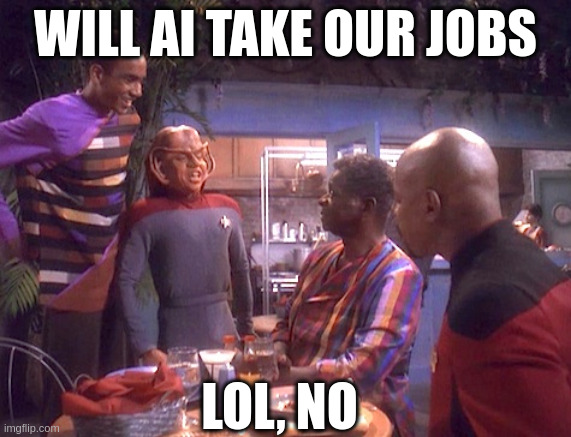
Despite replicators, teleportation, superintelligent AI, and dozens of other fantastic technologies, people still enjoy a home cooked meal, prepared by flawed, fumbly human hands.
Below, I’ll dig into why I think that is, some real world examples of this phenomenon, and why the future is safe. Though, the way to get there wont be easy.
The AI Debate፨
First, let’s frame the scene:
On one side, the “doomers” warn that AI will not only take all the jobs, but it will ultimately mean the end of humanity, either because we got in the way or it accidentally squishes us like how you step on an ant without even noticing.
Meanwhile, skeptics and accelerationists look at the current technology and balk. Some say fast takeoff1 is not likely to happen at all. And others say AI, even the superintelligent kind, will actually lead to human flourishing.
It’s January 2024 now. And despite having nearly 2 years to take hold, the debate seems firmly entrenched, with little change in the narrative and no real progress on regulation. Meanwhile, AI is quickly making it’s way into everyday products, creating new efficiencies, and taking jobs along the way.
To start, the arts are on the frontlines of this battle. Image generators like DALL·E, Midjourney, Stable Diffusion are quite good. It is already impacting working artists, and they are not happy about it mostly because companies scraped … ahem, learned … from nearly all art ever made.
But AI is also quickly taking hold in knowledge work. Lawyers are using AI to write their briefs, sometimes hallucinating caselaw in the process. And, the news media is using AI journalists to pump out stories.
So it’s clear that AI is going to have some effect on the job market. But is it going to be a cataclysmic end of work as we know it? Or, will this be a transition like the industrial revolution, computer revolution, or internet revolution?
That will be difficult to predict, but I’d like to argue that even in a world where AI can do everything better than humans2, there’s still a place for human work.
A Hopeful Future፨
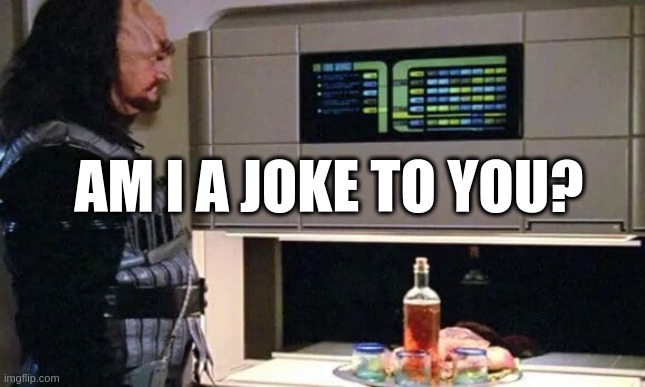
Why eat at Sisko’s, when the replicator can make a delicious gumbo at home?
Well we don’t have to wait! We can ask a similar question today. Why do good cooks still eat out at just-ok restaurants? It can’t always be because of the convenience or that they need someplace to meet friends.
This is even more obvious with music. In a world where we have every song ever recorded in our pocket, why do people go to concerts? The performance is almost guaranteed to have mistakes compared to the master. But, it’s thrilling anyways.
Similar in art, why did anyone buy this banana for $120,000?
It’s because of the experience, the story, the authenticity. It’s because we can connect to it and draw meaning for our lives. And, meaning is what keeps us alive, even in the worst times.
But, there’s one other example I’d like to mention: chess. Computers have been better than us at chess for a while. And yet, humans still play chess. And people watch, despite the fact that there are computer vs. computer chess tournaments, too. In fact, human chess is getting more popular recently.
It’s because we love watching the human body and mind pushed to it’s limit. We love watching people grow and overcome adversity.
And you could say the same about other sports. Why watch Usain Bolt when any car is faster?
I could go on, but to make a long story short: We love humanity. We love ourselves.
And given the chance, we’ll use our time and resources to experience that. People like to do things, and other people like having things done for them … by humans.
The Bad Part፨
So maybe the future doesn’t look so bleak for creative expression and fulfilling human work. What’s the catch? Well, it might be very rough getting there.
To illustrate a worst case scenario, let’s consider horses. Horses still have jobs. In fact, horses mostly have pretty nice jobs now.
They pull carriages. They race. They take part in rodeo sports. They compete in dance shows. They entertain people who like horseback riding. And sometimes, they help herd cattle, though ATV’s are more common for that I think.
Regardless of the specific job, it seems that on the whole, the types of jobs that are left for horses are much better than the alternative of hard manual labor like plowing fields in the summer heat, tirelessly delivering messages, or riding into battle.
But in the early 1900’s, the automobile, tank, and tractor took over the vast majority of horses jobs. This led to a significant overall decrease in the remaining need for horses. Here’s what that looks like on a population level3:
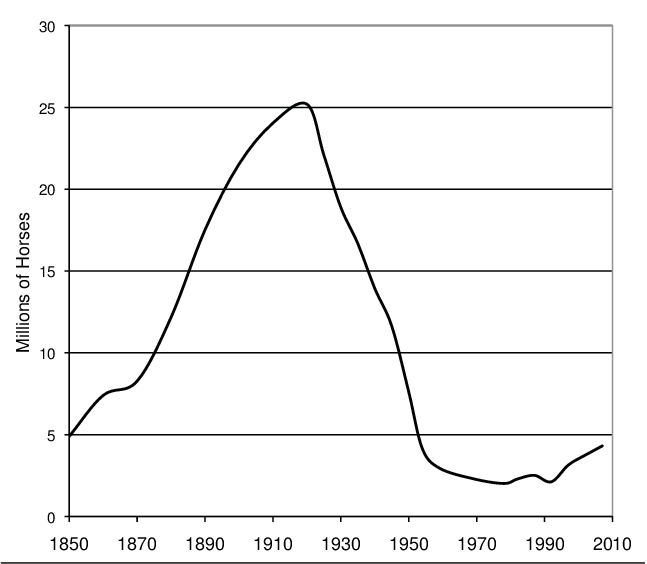
So…yikes. That’s pretty bad. And yet, horses are still around.
Though, you could show a similar curve for many human professions. For example, the collapse in horses meant a similar downturn in stable staff, horseshoe makers, veterinarians, and so on. And yet, new industries arose for them to move to.
You could argue that AI is categorically different. And it is taking jobs in a way that leaves no replacement. But people think that every time an invention comes along. The reality is that only time will tell.
Prompt “engineering” and data labeling have already started to take off as new job opportunities that can only exist in an AI world. Similarly, there is now a massive new wave of demand for software that integrates into AI capabilities. And who knows what opportunities will open up next?
Meanwhile, the cost of completely restructuring the economy to handle a future where humans have nothing meaningful to contribute to the world is unbelievably massive. Even if this was partially necessary, the social cost of restructuring the AI is basically impossible to confront until it is completely unbearable.
And yet in the long term, there’s no promise that we will survive AI. But if we do, it’s likely that there is some role we can play. And to the extent that we have any agency, we’ll enjoy doing things for each other. And, that is ultimately what a job is.
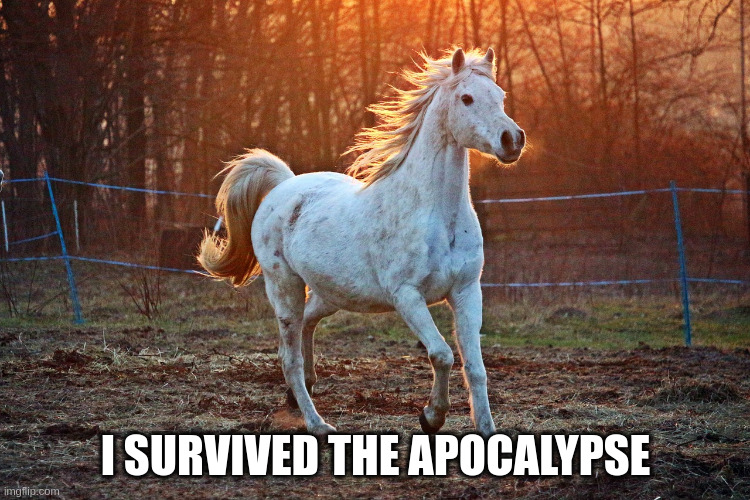
Conclusion፨
AI is here, at least an early form of it. It’s already starting to take people’s jobs, especially artists. And yet, I’m confident that there will still be artists in 2100. Why?
People love experiences. And they find more authenticity, connection & meaning in experiences of other humans. In particular, we like seeing other people demonstrate mastery of their craft, pushing the human body & mind to the limit.
However, there will still be a revolution upending the current economic order. People will need to find different things to do. And if they can’t, then we need to find a new economic order that gives them meaning and a role in society.
But if we come out the other side at all, then there will still be artists, cooks, musicians, chess players, and every other kind of job that humans do now.
This should give us pause though on our treatment of lower intelligences. How do we treat intelligent animals? Dolphins, whales, octopuses, elephants, dogs, monkeys, parrots, ravens, and more all show surprising levels of intelligence.
Are we ok with how we treat them? Because, we might be in their position someday sooner than we think.
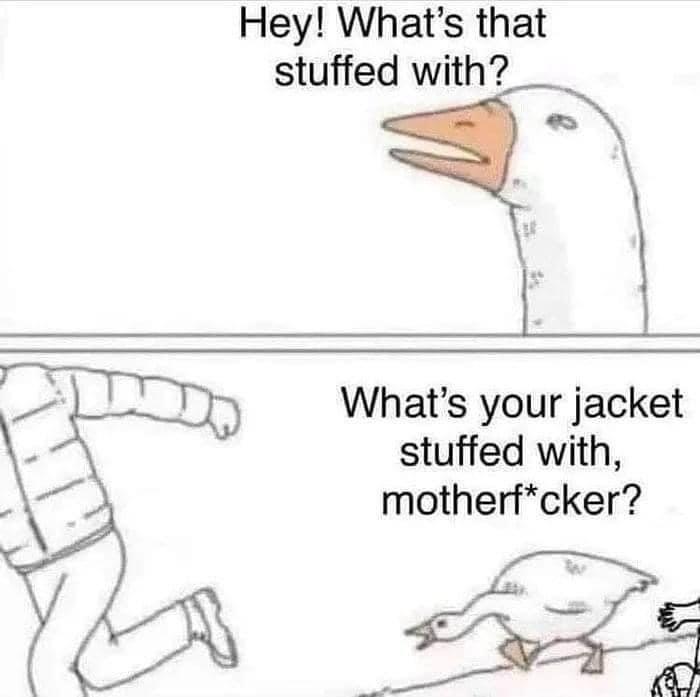
- Fast takeoff (FOOM) is the explosive growth of AI’s power far beyond the level of human retention and reasoning skills. This usually also implies iterative self-improvement, where the AI breaks out of human control and starts improving itself with each generation.
- This is setting aside the doom scenarios, where humans get wiped out in one way or another.
- This graph is just one example of a broad trend. It’s from a random paper I found: The Economic Impact of the Horse Industry in Virginia by Terance J. Rephann of University of Virginia.